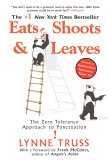Summary | Excerpt | Reviews | Beyond the Book | Readalikes | Genres & Themes | Author Bio

Critics' Opinion:
Readers' Opinion:
First Published:
Apr 2004, 240 pages
Paperback:
Apr 2006, 240 pages
 Book Reviewed by:
Book Reviewed by:
BookBrowse Review Team
Buy This Book
Meanwhile, the full stop is surely the simplest mark to understand – so long as everyone continues to have some idea what a sentence is, which is a condition that can't be guaranteed. As the original "point" (so called by Chaucer), it appears to occupy a place in our grammar that is unassailable. Every time the sentence ends, there is a full stop (or a full-stop substitute such as the exclamation mark or the question mark). As easy as that. If you resort to full stops all the time, by the way, and don't use anything else, and keep to very short sentences, people who have read H. W. Fowler's The King's English (1906) will accuse you of "spot plague" and perhaps also assume you are modelling yourself on Ernest Hemingway, but the good news is you can't go wrong grammatically. The American name "period", incidentally, was one of its original English names too. Just as the word "comma" originally referred to the piece of writing itself (rather than the mark that contained it), so "period" referred to a longer piece of writing. Shakespeare called the full stop a period in A Midsummer Night's Dream when he described nervous players "making periods in the midst of sentences". This was on the occasion of one of the first (and unfunniest) scenes of someone wrecking the sense of a speech by putting the full stops in the wrong place:
We do not come as minding to content you,
Our true intent is. All for your delight
We are not here.William Shakespeare,
A Midsummer Night's Dream, Act V, scene i
The tap water is safe to drink in tea and coffee, however, we recommend using bottled water for drinking, it can be purchased very cheaply in the nearby shops.
Reprinted from Eats, Shoots & Leaves by Lynne Truss by permission of Gotham Books, a member of Penguin Group (USA) Inc. Copyright © Lynne Truss, 2003. All rights reserved. This excerpt, or any parts thereof, may not be reproduced without permission.





The Flower Sisters
by Michelle Collins Anderson
From the new Fannie Flagg of the Ozarks, a richly-woven story of family, forgiveness, and reinvention.

The House on Biscayne Bay
by Chanel Cleeton
As death stalks a gothic mansion in Miami, the lives of two women intertwine as the past and present collide.

The Funeral Cryer by Wenyan Lu
Debut novelist Wenyan Lu brings us this witty yet profound story about one woman's midlife reawakening in contemporary rural China.
Your guide toexceptional books
BookBrowse seeks out and recommends the best in contemporary fiction and nonfiction—books that not only engage and entertain but also deepen our understanding of ourselves and the world around us.